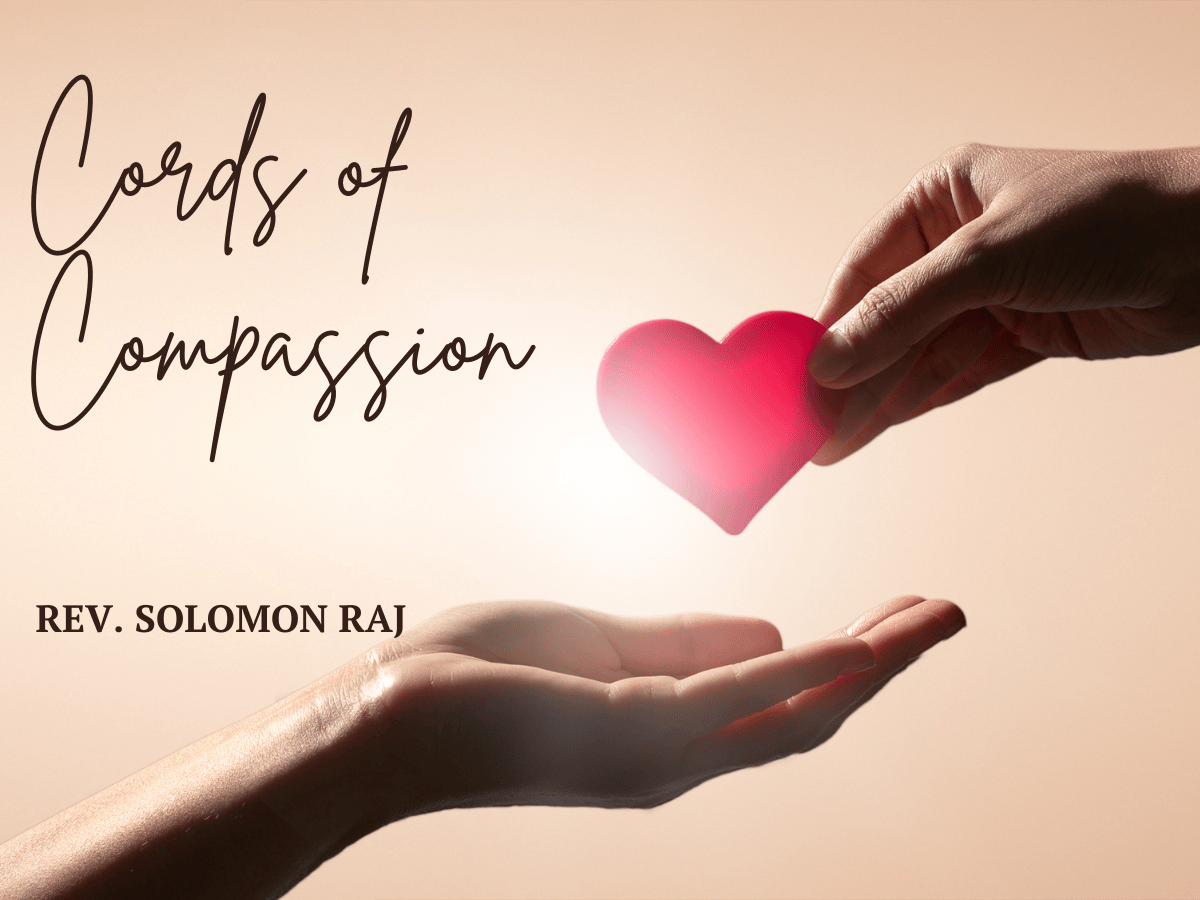
The book of Hosea illustrates God’s compassion for the unrighteous people. During the time of Hosea, Israel was at its height of prosperity. Hosea began the ministry through the ‘enactment of prophecy’, by marrying a harlot. The core essence of the prophecy was about the Compassion of YHWH (God) despite the shortcomings and the ingratitude nature of Israelites.
Love as a cord of compassion: ‘When Israel was a child, I loved him, and out of Egypt I called my son. But the more I called Israel, the further they went from me’ (Hos. 11:1-2). In vs.1 Israel referred to ‘sons’ of YHWH. God describes Israelites as sons not only in terms of their origin, but also takes the nation Israel, as the first-born son. God called out this son from Egypt.
This also means that there is an emphasis on election and adoption of Israel. The Hebrew word ‘naar’ is used which is very indefinite including any age from youngest childhood to some degree of maturity. God loved Israelites not because they are greater in number or any other reason. God loved the Israelites because of His compassion. Love of God can be seen at its highest form towards the Israelites – God loved Israelites despite of their ingratitude.
In verse 2 God says, the more I called them the more they went away from me. You have gone astray from me yet I love you. This, Love, which is a cord of Compassion was not properly reciprocated by the Israelites. Israelites not only ignored the Love of God, instead they rebelled against God. God still loved them.
This is not only true with Israelites but with many of us in our current situations! I want to call it as insensitivity or irresponsibility towards our expected responsibility as a Christian. That is we experience God’s love but are not responding to the love of God properly instead we reject as the Israelites. Though we are ungrateful to God but still God is compassionate towards us and loves us.
God’s love is one of the primary cords of compassion. In other words, let us be sensitive to the unlovable, for we are experiencing the love of God. Leading & guiding as a cord of compassion: ‘It was I who taught Ephraim to walk, taking them by the arms; but they did not realize it was I who healed them’ (Hos. 11:3). Hosea proclaims the message of God’s guidance through an ‘image of a tender, patient parent’ who is training the child. The child is slowly trained to walk.
The Hebrew Word ‘tirgalti’ is used which means teaching them to walk and keeping them on their feet that are directing in a providential way of their footsteps. YHWH took them upon His forearms – the arm symbolizes God’s strength and Israelites experienced the strength and might of Lord all through their lives and situations.
In verse 3, God says that you have not recognized my healing Yet I lead you. God guided Israelites like an affectionate parent who teaches a child to walk and yet they did not recognize God’s compassionate work in guiding and guarding them and in healing their diseases both temporal and spiritual. People are blamed for rejecting the knowledge gained through the experience of God’s healing. The word ‘yadeu’ refers to the experiential knowledge than informative knowledge. Liberation as a cord of compassion: ‘I led them with cords of human kindness, with ties of love; I lifted the yoke from their neck and bent down to feed them’ (Hos 11:4).
In Verse 4 we see a claim that it is YHWH who liberated Israelites. In this verse it says that I was to them like those who lift infants to their cheeks. The Hebrew translation of this verse is ‘who ease the yoke on their jaws’. The Hebrew word ‘ol’ is used which means yoke, symbolizes the oppression that Israelites went through. This word is used much in the covenantal contexts. Removal of yoke, as we know is a symbol of liberation. YHWH removes first the ropes from Israel’s arms and then goes on to harness cords of love on their jaws.
The implication is that YHWH liberated them but they are supposed to be under the tender guidance of the Lord. The expectations of YHWH however, turned futile. In v. 4 we see major shifts seen in the mode of presentation of the message of compassion by Hosea.
There is a metaphorical shift from human to an unyoked beast, with in these four verses. More over, we can also see shifts in person, gender and number as well. However different may be the shifts, it is clear that Hosea wants to make it a point that it was Yahweh’s compassion that made Israelites to get along in their struggles. God liberates despite human bondages. God says you are still under the bondage yet I liberate you.
God called Israelites out of Egypt and liberated them from their bondage. Yet God liberated them from their bondage of Sin. Are we reciprocating the love of God? The love of God can be best depicted and reciprocated with love for neighbor’s, humanity and nature. Do we have any right to deny the love of God to those who are deprived in many forms of it, be it gender, economically and in many ways. It is not only love the only cord of compassion, but as a promise we also have God’s leading as a cord of compassion and over all, God’s liberation & living presence as a cord of compassion. Since God is compassionate, it is high time for us to practice God’s compassion with all the three cords intertwined. We need to love, lead and liberate people from all their bondages. We need to exhibit and practice the cords of God’s compassion.
Author: Rev. Solomon Raj is an ordained minister of the Church of South India, Medak Diocese


